National Food Strategy targets meat to reduce global warming
By Lisa Young @SouthWestFarmer
Content editor

The National Food Strategy says meat consumption needs to be cut by 30 per cent by 2030

The National Food Strategy says meat consumption needs to be cut by 30 per cent by 2030
People could be encouraged to eat less meat, Henry Dimbleby’s National Food Strategy suggests, write Emily Beament and Lisa Young.
The report warns meat consumption needs to be cut by 30 per cent by 2030 to reduce methane emissions from cattle and sheep that help drive global warming, and to free up land for absorbing carbon and boosting nature.
The report said a tax to drive the shift away from meat was unpopular.
Poorer households would be penalised because it would hike prices more on cheap cuts or mince.
Instead it said the government should invest £50million in supporting the development of alternative proteins such as lab-grown meat or plant-based foods.
It urged the UK to position itself at the front of the new industry of alternative proteins, which it said could easily replace ingredients such as mince or milk powder in lasagne or even the meat in a takeaway sandwich.
Responding to the report, NFU president Minette Batters said: “This food strategy should act as a wake-up call for us all that we need to value the food we eat.
“I agree that we should be supporting everyone to eat more fruit and veg, something our farmers can support by growing more, and there should be more focus on educating our children about valuing and understanding the food they eat and how it has been produced.
“However, it is important that we do not throw meat into one blanket category and that we all make a clear distinction between grass-fed British meat and cheap imports.
“We should be considering British meat in its own category, recognising its sustainability and dense nutritional value.
"After all, scientific and medical communities agree it is a key part of a healthy, balanced diet, chock full of essential vitamins and minerals.
“This strategy says major reform is needed of the food system.
"I would suggest we first look at the actions our government is taking by agreeing to trade deals that welcomes in imported meat in limitless amounts."
The report comes as supermarkets are already increasing and promoting their plant-based options, and meat-free alternatives are becoming more popular.
Government investment in innovation will speed up measures to cut methane emissions, such as adding certain ingredients such as seaweed to feed to reduce the amount of the potent greenhouse gas from meat and dairy, the report said.
However, cutting methane is not enough, as the UK also needs to free up land for absorbing carbon emissions from other hard-to-tackle sectors such as aviation, by restoring forests or peatlands.
The report suggests around 5-8 per cent of the UK’s total farmland would need to be freed from production almost entirely, mainly to plant broadleaf woodland and restore peat bogs, focusing on areas such as uplands which are least productive.
It recommends mapping England’s countryside to see which areas could be chiefly for food production, for carbon storage and nature, or for low intensity wildlife-friendly farming.
This could include reductions in sheep, restoring wild features and introducing hardy cattle – but that requires sufficient long-term government support, the report said, and urged the payments scheme for environmental farming to be guaranteed until 2029 to help farmers plan.
The government should also provide around £500-£700 million a year, around a third of the total scheme, for paying farmers to manage the land to actively store carbon and restore nature, through broadleaf woodland, restored upland peat and species-rich grassland and heath.
, Simon Billing, executive director at Eating Better alliance of groups urging a switch to less and better meat and dairy, said: “As a nation, rebalancing our diets with a lot more veg and less meat, will enable us to eat better meat from the best of British farms with the highest environmental and animal welfare standards.”
Mark Bridgeman, president of the Country Land and Business Association (CLA), said: “The strategy highlights the need to properly reward farmers for environmental improvements above and beyond what they already do.”
He urged the Government to understand the role livestock played in environmental management and not to succumb to the “false narrative” that meat is inherently bad.
“It is right to consider alternative ways of farming and different uses for land. Enhanced tree planting and peatland restoration will play an important role in further boosting landowner’s efforts to mitigate climate change and biodiversity decline.
“But any change in land use, particularly to the extent that the strategy recommends, must be driven by the market and positive incentives rather than compulsion – and not come at the expense of the country’s ability to feed itself,” he said.
David Edwards, director of food strategy at WWF, said: “The way we produce our food is key to the UK reaching its net zero and nature restoration targets, so we must bolster funding of nature-friendly farming and set core environmental standards to stop the import of products which rely on the worst farming practices for nature, are already banned in the UK, and which undermine British farmers’ efforts towards more sustainable agriculture.
“We should not waste this golden opportunity to give the British public the affordable, sustainable and healthy food they want and deserve.”
No comments:
Post a Comment